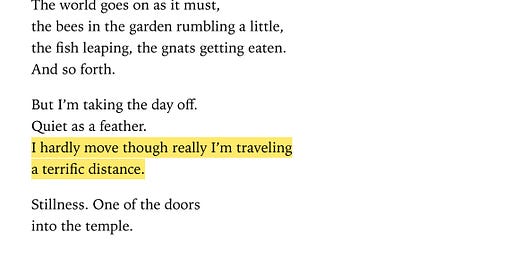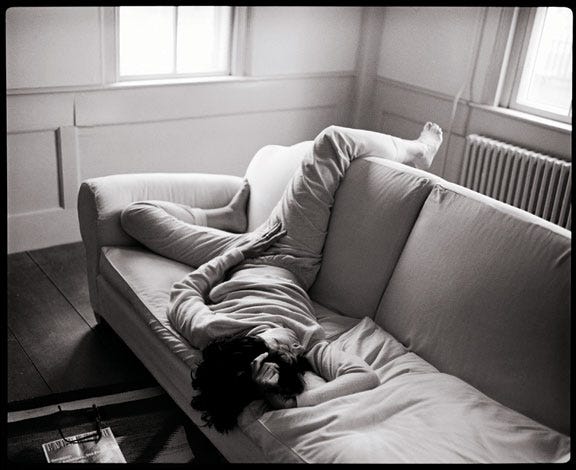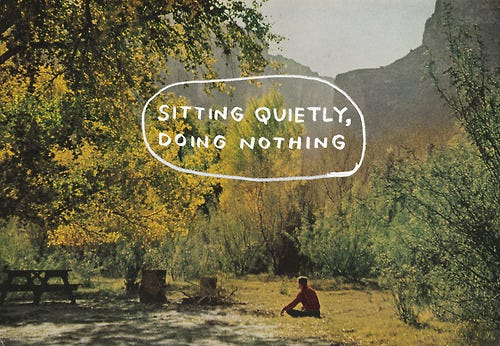Hello friends, it’s been a while, but this newsletter isn’t called Press Pause for nothing. To paraphrase a line from the Mary Oliver poem today’s letter takes its title from, these past months I’ve been flying low —and I didn’t say a word. I want to thank you for still being here, I do appreciate your faith in this little project.
A few days ago I read this poem by Mary Oliver and I thought it would be fitting to offer it to you along with some usual ramblings.
I’d love to tell you I’ve enjoyed beautiful moments of stillness, but the truth is there’s been a lot of hard times. And so I had to pause. My initial instinct was to apologise for the newsletter’s absence from your inbox, but right after I began typing about the many trials I had to overcome lately, I was suddenly struck by my own hypocrisy. How could I possibly be publishing under a title as boisterous as Press Pause, and then offer excuses over the very same thing I’m urging us all to do?
“Doing nothing is hard,” reminds us Jenny Odell and unsubscribing from ideas of productivity as value requires discipline and self-awareness, which in no way I’ve been able to master yet. Social media is flooded with posts encouraging us to “take a break”, “practice self-care,” but truly the tentacles of capital have enveloped even the idea of rest. Who are we when not engaged in some sort of labor, producing, creating, posting, consuming? Do we even exist?
It’s hard to let go of the internalised belief that we are what we produce, and it’s an even bigger challenge to accept that we are enough as we are and are allowed to slow down from time to time.
To resist in place is to make oneself into a shape that cannot so easily be appropriated by a capitalist value system. To do this means refusing the frame of reference: in this case a frame of reference in which value is determined by productivity, the strength of one’s career, and individual entrepreneurship. It means embracing and trying to inhabit somewhat fuzzier or blobbier ideas: of maintenance as productivity, of the importance of nonverbal communication, and of the mere experience of life as the highest goal. It means recognizing and celebrating a form of the self that changes over time, exceeds algorithmic description, and whose identity doesn’t always stop at the boundary of the individual.1
“I work, I love, I rest, I see and learn.”
—Audre Lorde2
Across two different essays collected in The Source of Self-Regard, Toni Morrison identifies stillness as one of three responses to chaos. “Such stillness can be passivity and dumbfoundedness; it can be paralytic fear. But it can also be art.” Then, later: “Stillness is what lies in awe, in meditation.”
Around the time I started the newsletter last year, I also began reading Pema Chodrön’s When Things Fall Apart. It’s a book I pick up when the restlessness becomes louder, when the jitters reach my hands and they become numb but for a faint tingle, like infinitesimally small needless prickling through the skin. It’s a readable manual to set off an exploration into becoming more aware of ourselves and learning how to understand and deal with feelings that are commonly identified as negative, like fear. Chödron is a gateway to learn about Buddhist teachings, and I do encourage you to turn to her work, even for a little bit of spiritual solace.
Underneath our ordinary lives, underneath all the talking we do, all the moving we do, all the thoughts in our minds, there’s a fundamental groundlessness. It’s there bubbling all the time. We experience it as restlessness and edginess. We experience it as fear.
Chödron tells us that groundlessness is fertile soil for growth:
The off-centre, in-between state is an ideal situation, a situation in which we don’t get caught and we can open our hearts and minds beyond limit. It’s a very tender, nonaggressive, open-ended state of affairs.
We should then lean into refraining, which she describes as “the practice of not immediately filling up space just because there’s a gap.” It’s a path to explore where the restlessness and fear spring from, an experiment in floating in the deep waters of stillness.
It’s a transformative experience to simply pause instead of immediately filling up the space. By waiting, we begin to connect with fundamental restlessness as well as fundamental spaciousness.
Thank you for reading! If you liked this letter, you can forward it to a friend who may enjoy it or share it on social media.
Jenny Odell, How to Do Nothing
A Burst of Light: Living with Cancer, from Audre Lorde, A Burst of Light







